Resume
Medical Technologist Cover Letter Examples

May 29, 2025
|
12 min read
Unlock success with your medical technologist cover letter: use these simple tips to “lab” the perfect job. Discover methods to highlight your skills and experiences, ensuring your application gets top examination by potential employers.
4.70 Average rating
Rated by 348 people
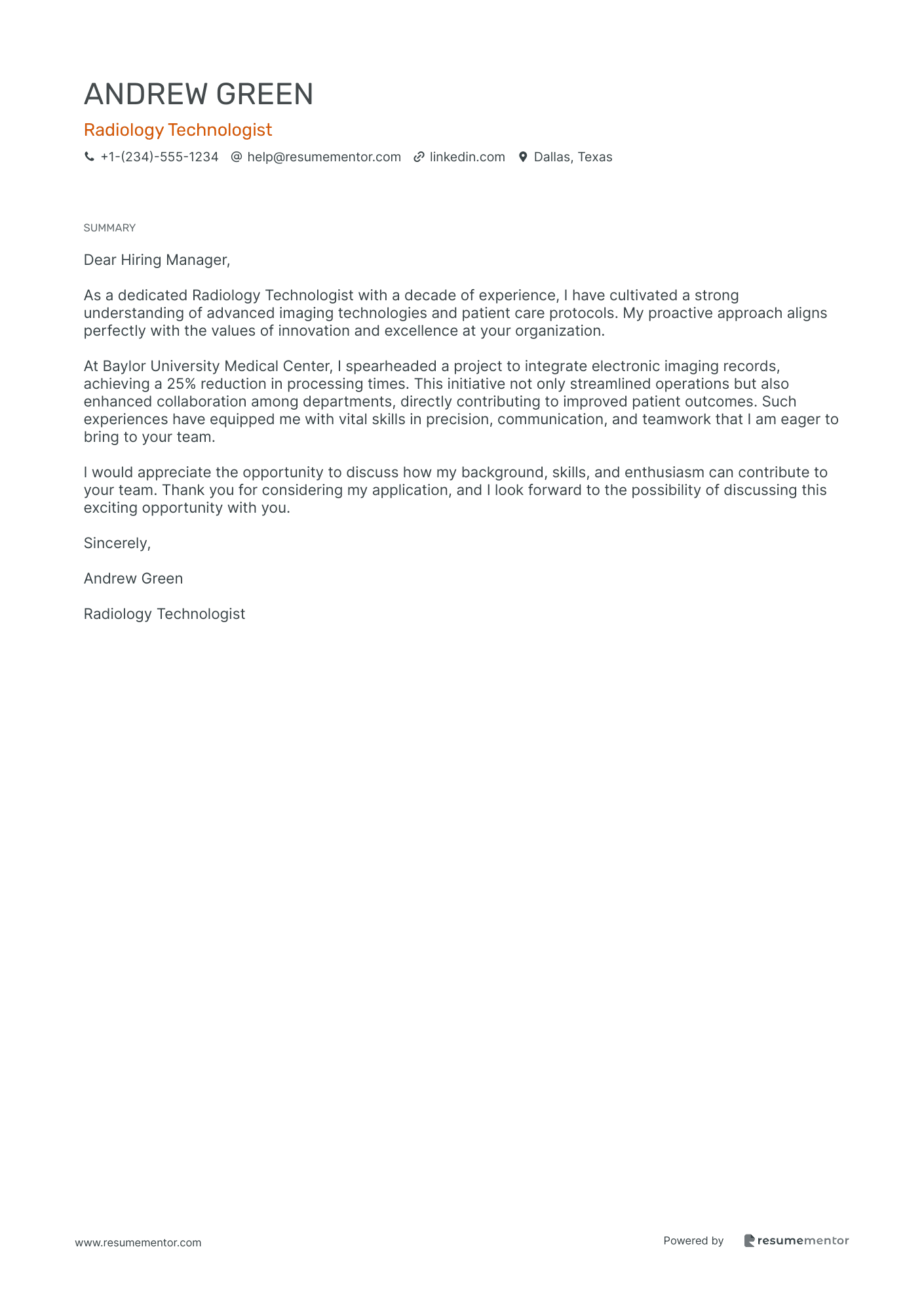
Radiology Technologist
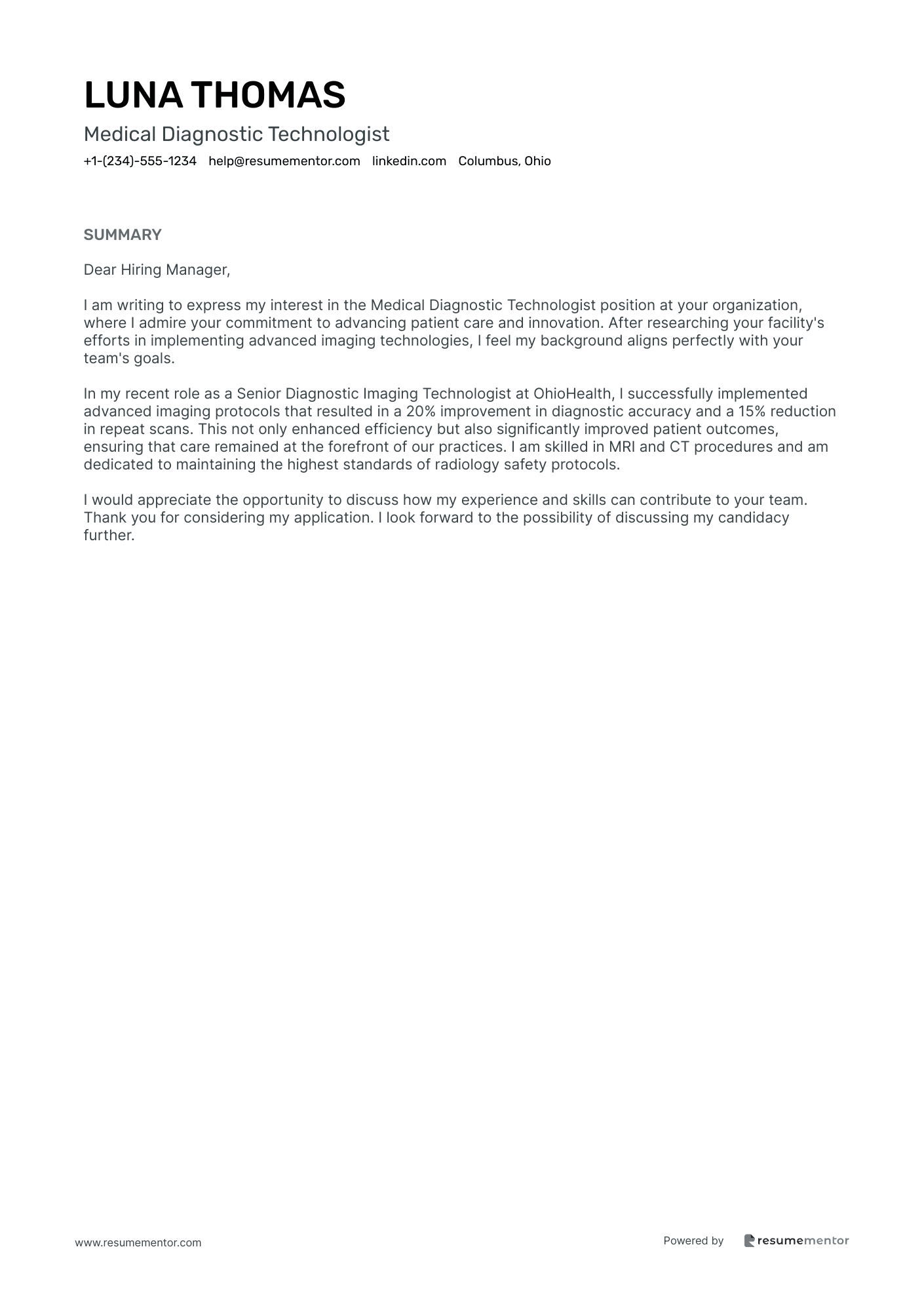
Medical Diagnostic Technologist
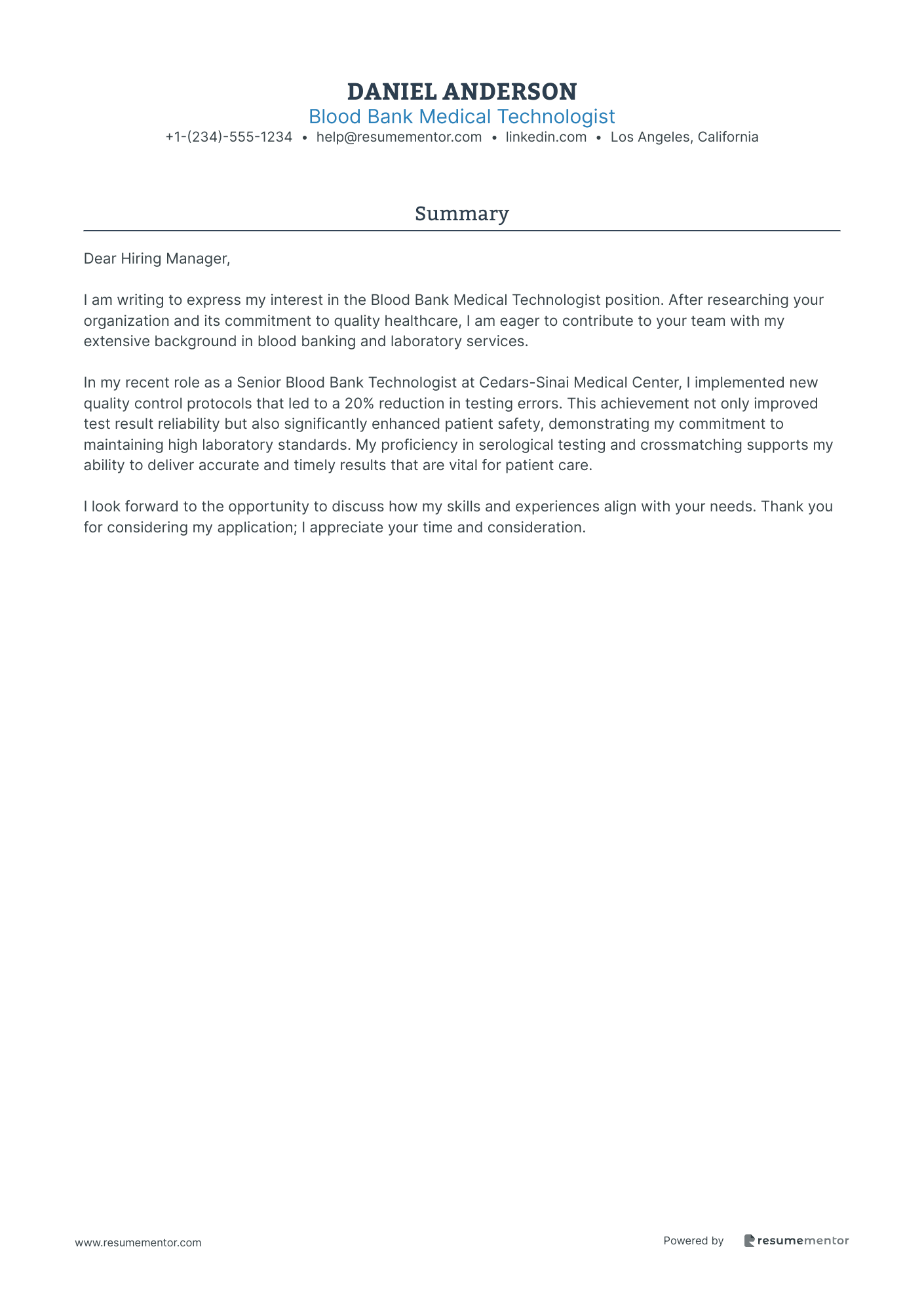
Blood Bank Medical Technologist
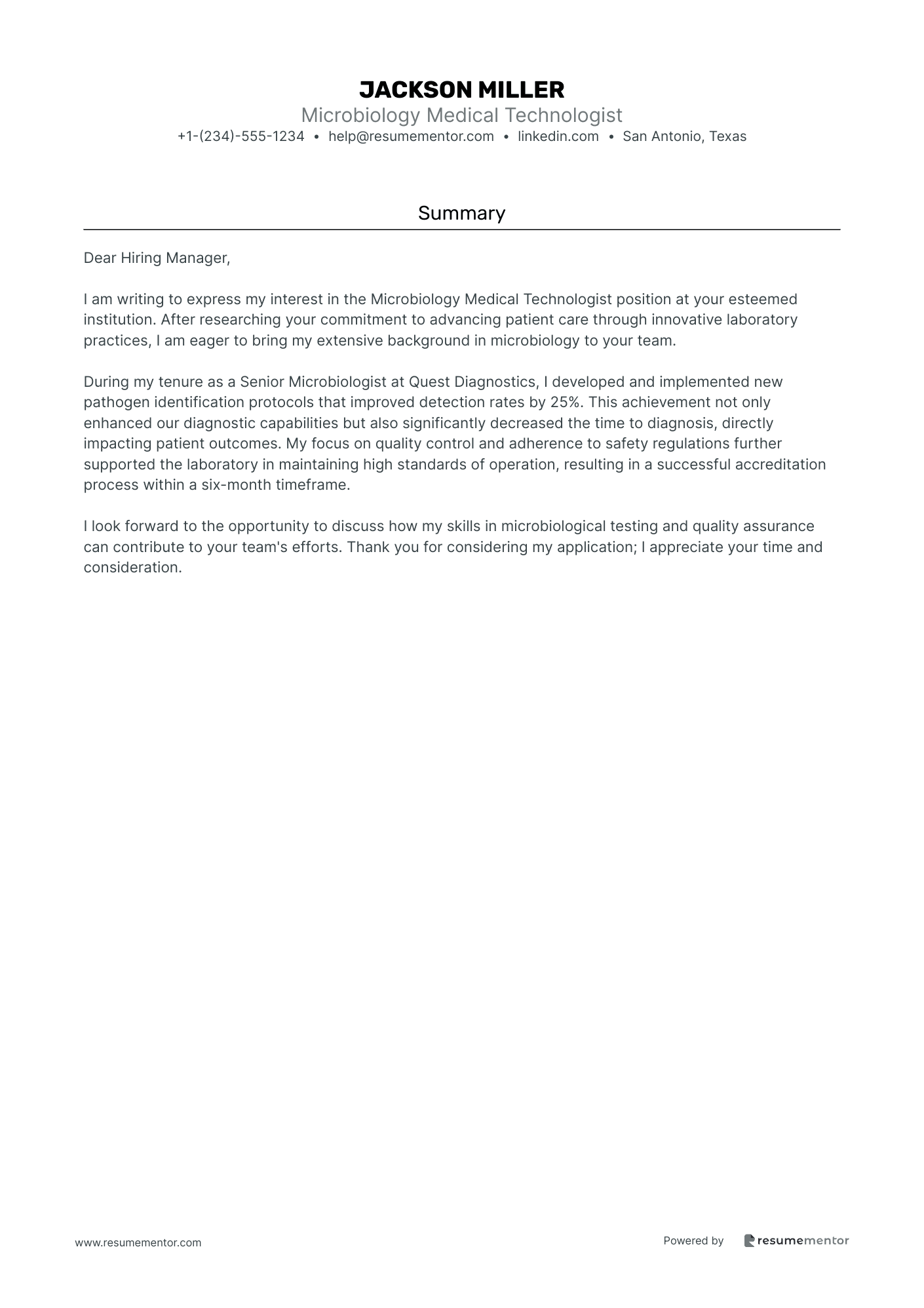
Microbiology Medical Technologist
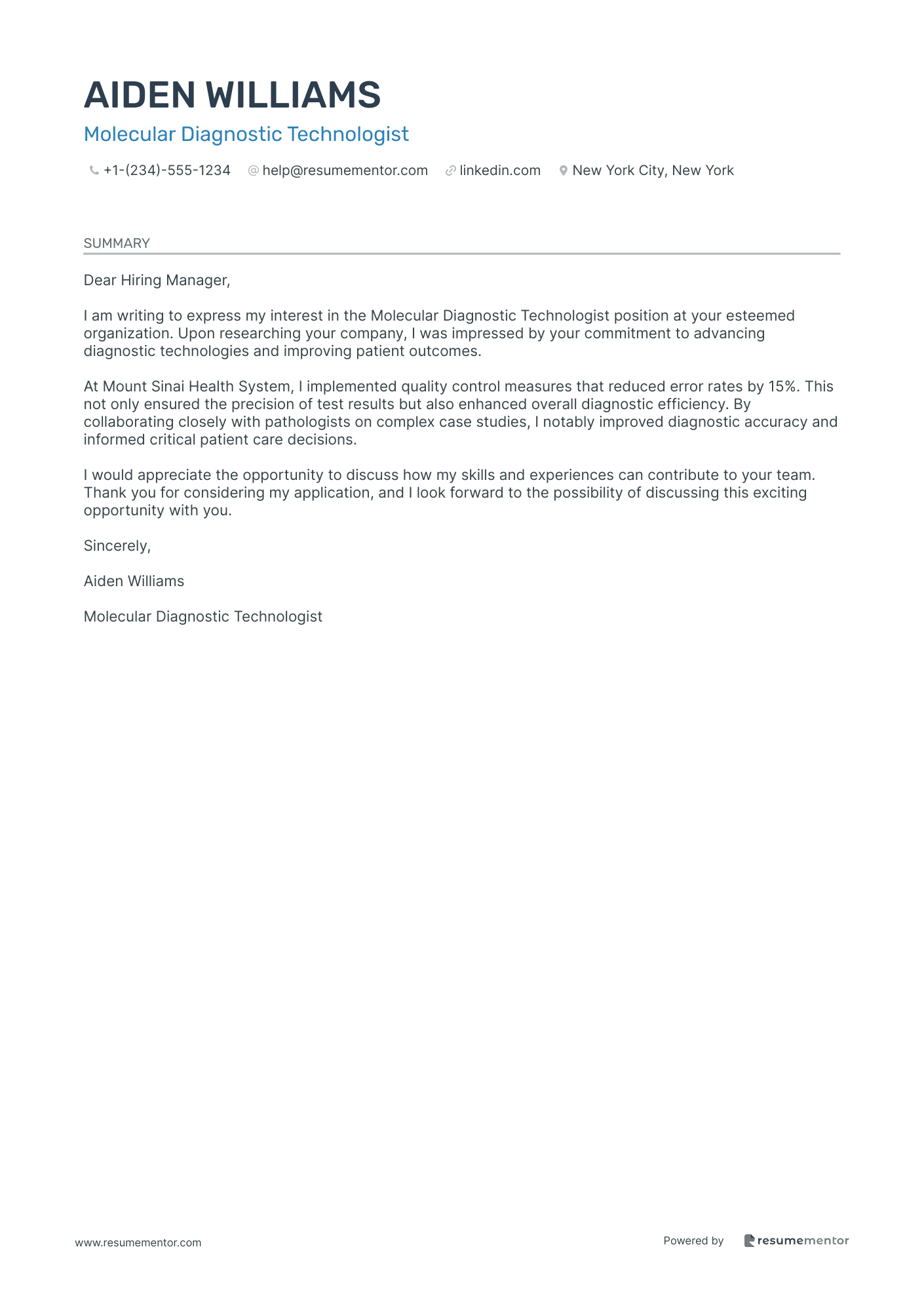
Molecular Diagnostic Technologist
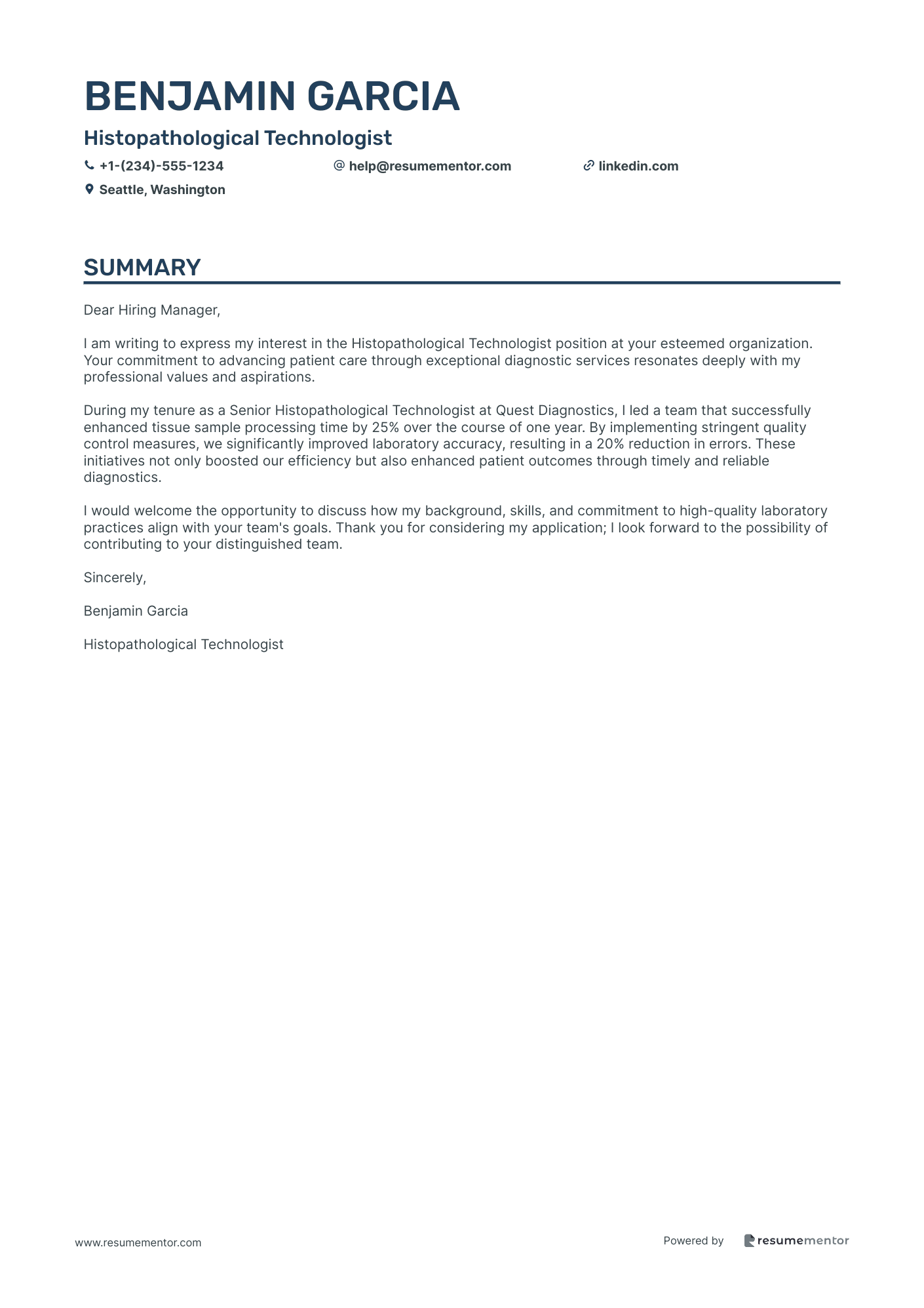
Histopathological Technologist
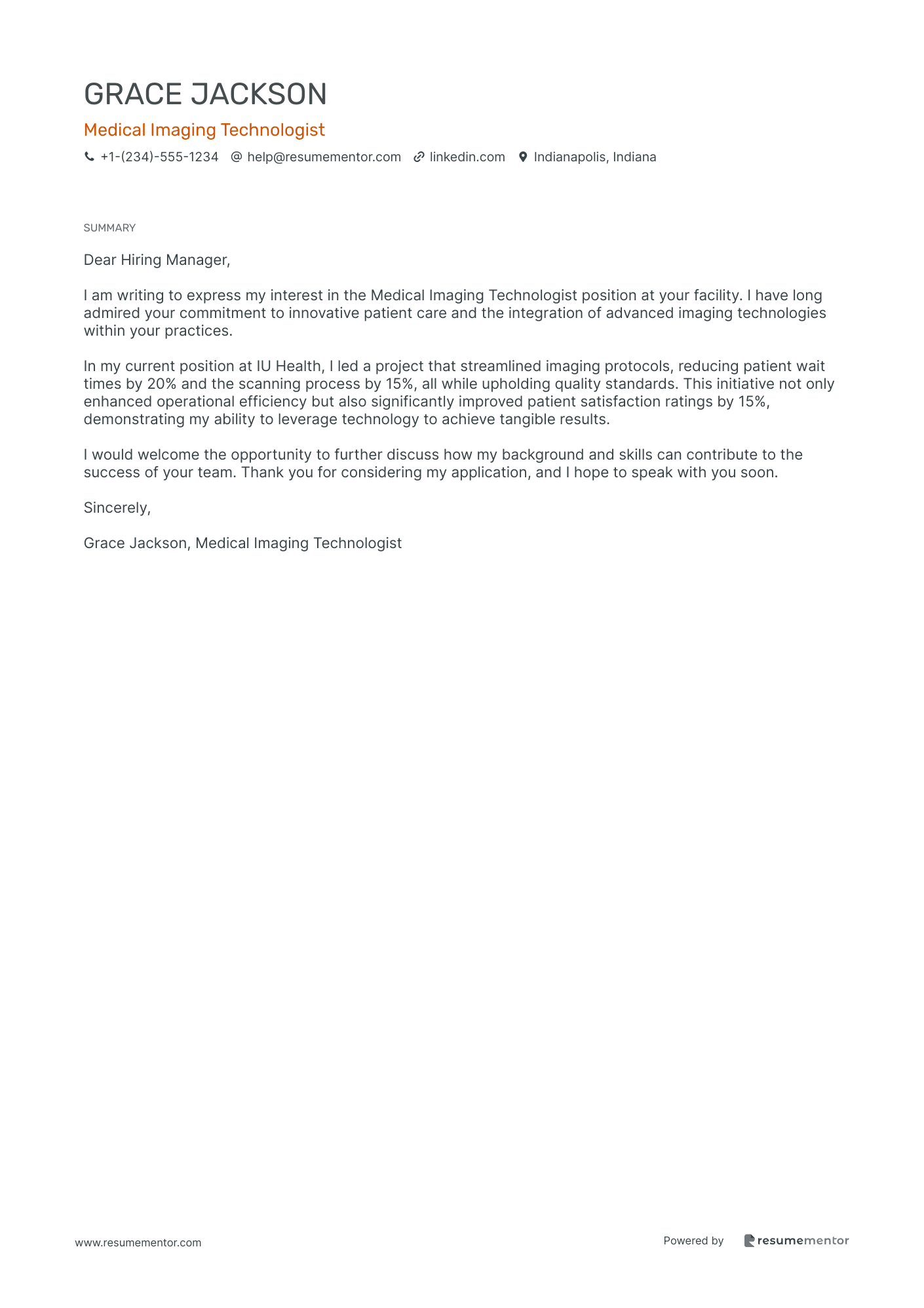
Medical Imaging Technologist
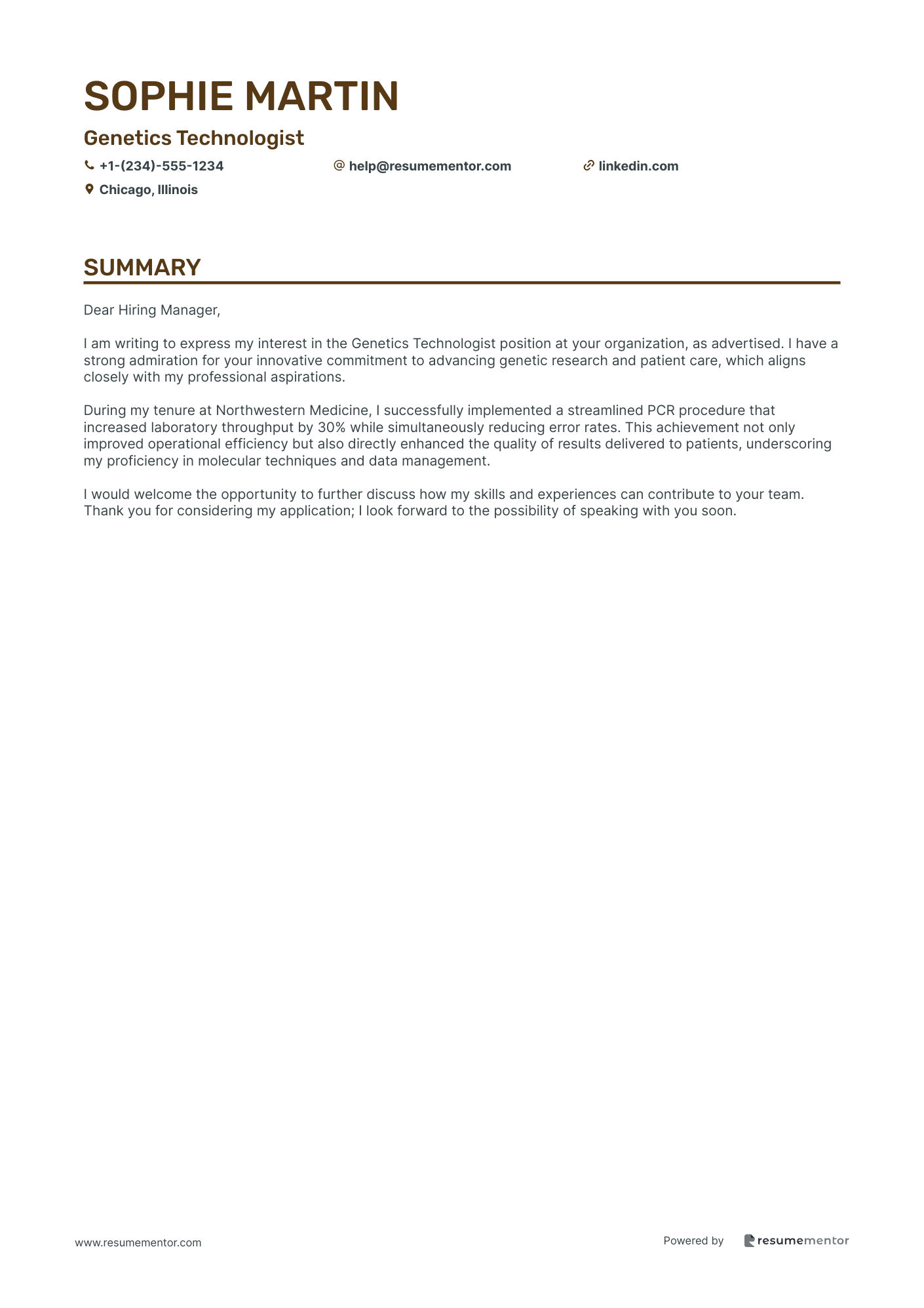
Genetics Technologist
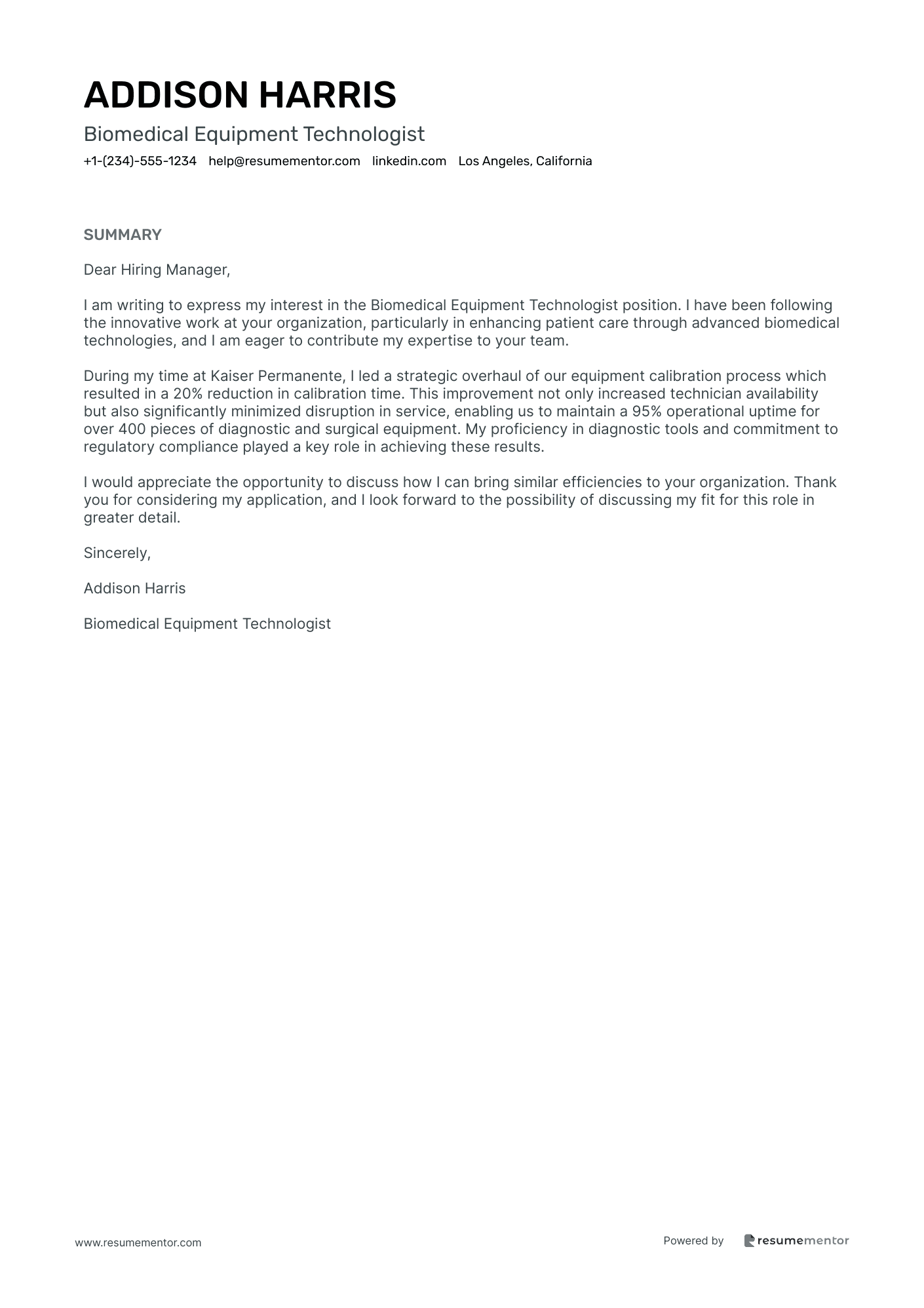
Biomedical Equipment Technologist
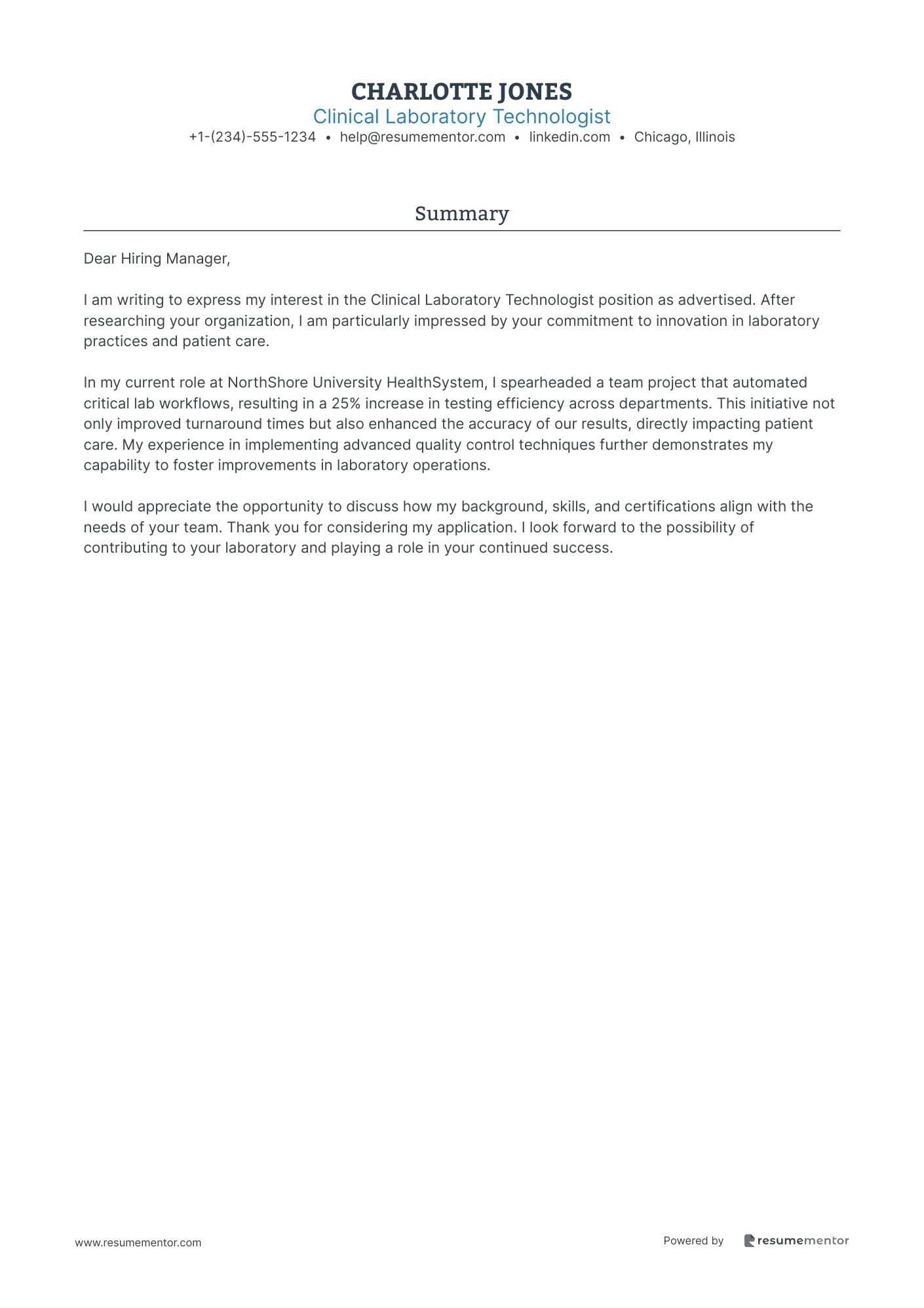
Clinical Laboratory Technologist

Radiology Technologist cover letter sample
When applying for this position, it's important to showcase any prior experience with imaging equipment and patient care. Highlight your ability to work in fast-paced environments, as well as your attention to detail, which ensures accurate imaging results. If you've completed relevant training or earned certifications, mention these as they demonstrate your commitment to the field. Provide examples of how you’ve improved procedures or patient satisfaction, utilizing a 'skill-action-result' format to clearly illustrate your impact on the healthcare team and patient outcomes.
Summary
Dear Hiring Manager,
As a dedicated Radiology Technologist with a decade of experience, I have cultivated a strong understanding of advanced imaging technologies and patient care protocols. My proactive approach aligns perfectly with the values of innovation and excellence at your organization.
At Baylor University Medical Center, I spearheaded a project to integrate electronic imaging records, achieving a 25% reduction in processing times. This initiative not only streamlined operations but also enhanced collaboration among departments, directly contributing to improved patient outcomes. Such experiences have equipped me with vital skills in precision, communication, and teamwork that I am eager to bring to your team.
I would appreciate the opportunity to discuss how my background, skills, and enthusiasm can contribute to your team. Thank you for considering my application, and I look forward to the possibility of discussing this exciting opportunity with you.
Sincerely,
Andrew Green
Radiology Technologist
Medical Diagnostic Technologist cover letter sample
When applying for this position, highlight your familiarity with laboratory equipment and diagnostic procedures. Experience with quality control and safety protocols is essential, so include any relevant certifications or training you have completed. Emphasize your attention to detail, as errors can impact patient outcomes. Additionally, provide examples of how you have effectively collaborated with healthcare teams to improve diagnostic efficiency. Use the 'skill-action-result' format to illustrate how your contributions have led to enhanced accuracy or reduced turnaround times in previous roles.
Luna Thomas
Medical Diagnostic Technologist
Summary
Dear Hiring Manager,
I am writing to express my interest in the Medical Diagnostic Technologist position at your organization, where I admire your commitment to advancing patient care and innovation. After researching your facility's efforts in implementing advanced imaging technologies, I feel my background aligns perfectly with your team's goals.
In my recent role as a Senior Diagnostic Imaging Technologist at OhioHealth, I successfully implemented advanced imaging protocols that resulted in a 20% improvement in diagnostic accuracy and a 15% reduction in repeat scans. This not only enhanced efficiency but also significantly improved patient outcomes, ensuring that care remained at the forefront of our practices. I am skilled in MRI and CT procedures and am dedicated to maintaining the highest standards of radiology safety protocols.
I would appreciate the opportunity to discuss how my experience and skills can contribute to your team. Thank you for considering my application. I look forward to the possibility of discussing my candidacy further.
Blood Bank Medical Technologist cover letter sample
When applying for this role, focus on any previous laboratory experience, particularly in blood banking or immunohematology. Mention your proficiency with blood component preparation, cross-matching, and serological testing. Highlight any certifications, such as ASCP or HLA specialist, underscoring your commitment to continuous learning. Showcase your attention to detail and ability to maintain compliance with safety regulations. Provide examples that illustrate how your technical skills improved processes in previous roles, emphasizing the outcomes and benefits to patient care and operational efficiency.
Daniel Anderson
Blood Bank Medical Technologist
Summary
Dear Hiring Manager,
I am writing to express my interest in the Blood Bank Medical Technologist position. After researching your organization and its commitment to quality healthcare, I am eager to contribute to your team with my extensive background in blood banking and laboratory services.
In my recent role as a Senior Blood Bank Technologist at Cedars-Sinai Medical Center, I implemented new quality control protocols that led to a 20% reduction in testing errors. This achievement not only improved test result reliability but also significantly enhanced patient safety, demonstrating my commitment to maintaining high laboratory standards. My proficiency in serological testing and crossmatching supports my ability to deliver accurate and timely results that are vital for patient care.
I look forward to the opportunity to discuss how my skills and experiences align with your needs. Thank you for considering my application; I appreciate your time and consideration.
Microbiology Medical Technologist cover letter sample
When crafting your cover letter, focus on any laboratory experience with microbiological techniques. Highlight familiarity with quality control measures and safety protocols. If you have certifications in clinical microbiology or have completed relevant coursework, be sure to mention these. Stress your ability to analyze test results and how those findings led to improved patient outcomes. Use specific examples that demonstrate your attention to detail and problem-solving skills, showcasing how these traits have positively impacted your previous roles and the organizations you have worked for.
Jackson Miller
Microbiology Medical Technologist
Summary
Dear Hiring Manager,
I am writing to express my interest in the Microbiology Medical Technologist position at your esteemed institution. After researching your commitment to advancing patient care through innovative laboratory practices, I am eager to bring my extensive background in microbiology to your team.
During my tenure as a Senior Microbiologist at Quest Diagnostics, I developed and implemented new pathogen identification protocols that improved detection rates by 25%. This achievement not only enhanced our diagnostic capabilities but also significantly decreased the time to diagnosis, directly impacting patient outcomes. My focus on quality control and adherence to safety regulations further supported the laboratory in maintaining high standards of operation, resulting in a successful accreditation process within a six-month timeframe.
I look forward to the opportunity to discuss how my skills in microbiological testing and quality assurance can contribute to your team's efforts. Thank you for considering my application; I appreciate your time and consideration.
Molecular Diagnostic Technologist cover letter sample
When applying for this role, it's important to highlight any laboratory experience, particularly with molecular techniques such as PCR or sequencing. Emphasize familiarity with quality control procedures and regulatory compliance, as these are critical in the field. If you've completed relevant training or certifications, like CLIA or CAP, mention these to demonstrate your qualifications. Additionally, provide specific examples of how your technical skills improved accuracy or efficiency in past projects, using a ‘task-action-result’ framework to showcase your contributions effectively.
Aiden Williams
Molecular Diagnostic Technologist
Summary
Dear Hiring Manager,
I am writing to express my interest in the Molecular Diagnostic Technologist position at your esteemed organization. Upon researching your company, I was impressed by your commitment to advancing diagnostic technologies and improving patient outcomes.
At Mount Sinai Health System, I implemented quality control measures that reduced error rates by 15%. This not only ensured the precision of test results but also enhanced overall diagnostic efficiency. By collaborating closely with pathologists on complex case studies, I notably improved diagnostic accuracy and informed critical patient care decisions.
I would appreciate the opportunity to discuss how my skills and experiences can contribute to your team. Thank you for considering my application, and I look forward to the possibility of discussing this exciting opportunity with you.
Sincerely,
Aiden Williams
Molecular Diagnostic Technologist
Histopathological Technologist cover letter sample
When preparing your cover letter, emphasize your experience with tissue processing, staining techniques, and microscopy. Highlight any certifications or training in laboratory safety and quality control. Include specific examples of how your meticulous attention to detail has contributed to accurate diagnoses. Mention your ability to work collaboratively with pathologists and other laboratory staff, illustrating how it fosters a more efficient workflow. Demonstrating your problem-solving skills in troubleshooting laboratory equipment can set you apart and show your value to potential employers.
Benjamin Garcia
Histopathological Technologist
Summary
Dear Hiring Manager,
I am writing to express my interest in the Histopathological Technologist position at your esteemed organization. Your commitment to advancing patient care through exceptional diagnostic services resonates deeply with my professional values and aspirations.
During my tenure as a Senior Histopathological Technologist at Quest Diagnostics, I led a team that successfully enhanced tissue sample processing time by 25% over the course of one year. By implementing stringent quality control measures, we significantly improved laboratory accuracy, resulting in a 20% reduction in errors. These initiatives not only boosted our efficiency but also enhanced patient outcomes through timely and reliable diagnostics.
I would welcome the opportunity to discuss how my background, skills, and commitment to high-quality laboratory practices align with your team's goals. Thank you for considering my application; I look forward to the possibility of contributing to your distinguished team.
Sincerely,
Benjamin Garcia
Histopathological Technologist
Medical Imaging Technologist cover letter sample
Emphasize any experience with imaging equipment and technology in your cover letter. Highlight proficiency in handling MRI, CT scans, or ultrasound machines, as these are critical skills. If you have certifications like ARRT or specific training in advanced imaging, make sure to mention them. Show how your attention to detail has directly affected patient care and enhanced diagnostic accuracy. Use specific examples where your skills led to improved workflows or reduced wait times, following a ‘skill-action-result’ structure to demonstrate your impact effectively.
Grace Jackson
Medical Imaging Technologist
Summary
Dear Hiring Manager,
I am writing to express my interest in the Medical Imaging Technologist position at your facility. I have long admired your commitment to innovative patient care and the integration of advanced imaging technologies within your practices.
In my current position at IU Health, I led a project that streamlined imaging protocols, reducing patient wait times by 20% and the scanning process by 15%, all while upholding quality standards. This initiative not only enhanced operational efficiency but also significantly improved patient satisfaction ratings by 15%, demonstrating my ability to leverage technology to achieve tangible results.
I would welcome the opportunity to further discuss how my background and skills can contribute to the success of your team. Thank you for considering my application, and I hope to speak with you soon.
Sincerely,
Grace Jackson, Medical Imaging Technologist
Genetics Technologist cover letter sample
When crafting your cover letter, emphasize your hands-on experience with DNA sequencing technologies and laboratory techniques. Detail your familiarity with genetic analysis software and any relevant laboratory certifications you've obtained. Highlight your ability to troubleshoot technical issues, demonstrating your problem-solving skills. Provide examples of how your attention to detail has improved experimental outcomes or contributed to successful research projects. Mention any collaboration with multidisciplinary teams, showcasing your teamwork skills and how they led to innovative solutions in genetic research.
Sophie Martin
Genetics Technologist
Summary
Dear Hiring Manager,
I am writing to express my interest in the Genetics Technologist position at your organization, as advertised. I have a strong admiration for your innovative commitment to advancing genetic research and patient care, which aligns closely with my professional aspirations.
During my tenure at Northwestern Medicine, I successfully implemented a streamlined PCR procedure that increased laboratory throughput by 30% while simultaneously reducing error rates. This achievement not only improved operational efficiency but also directly enhanced the quality of results delivered to patients, underscoring my proficiency in molecular techniques and data management.
I would welcome the opportunity to further discuss how my skills and experiences can contribute to your team. Thank you for considering my application; I look forward to the possibility of speaking with you soon.
Biomedical Equipment Technologist cover letter sample
When applying for this position, it's important to emphasize any hands-on experience with medical devices and equipment maintenance. Highlight your technical skills, such as problem-solving abilities and knowledge of electronics or mechanical systems. If you hold relevant certifications, like 'Certified Biomedical Equipment Technician,' be sure to include them. Provide concrete examples of how you've improved equipment functionality or reduced downtime. Use a 'skill-action-result' structure to demonstrate how your contributions directly led to better patient outcomes or increased operational efficiency.
Addison Harris
Biomedical Equipment Technologist
Summary
Dear Hiring Manager,
I am writing to express my interest in the Biomedical Equipment Technologist position. I have been following the innovative work at your organization, particularly in enhancing patient care through advanced biomedical technologies, and I am eager to contribute my expertise to your team.
During my time at Kaiser Permanente, I led a strategic overhaul of our equipment calibration process which resulted in a 20% reduction in calibration time. This improvement not only increased technician availability but also significantly minimized disruption in service, enabling us to maintain a 95% operational uptime for over 400 pieces of diagnostic and surgical equipment. My proficiency in diagnostic tools and commitment to regulatory compliance played a key role in achieving these results.
I would appreciate the opportunity to discuss how I can bring similar efficiencies to your organization. Thank you for considering my application, and I look forward to the possibility of discussing my fit for this role in greater detail.
Sincerely,
Addison Harris
Biomedical Equipment Technologist
Clinical Laboratory Technologist cover letter sample
When writing your cover letter, focus on your technical skills and laboratory experience. Highlight any certifications, such as CLT or ASCP, and specify your proficiency with equipment like analyzers and microscopes. Include examples of how your attention to detail has led to accurate test results. Emphasize your ability to work under pressure and your commitment to following safety protocols. Discuss how your contributions improved workflow efficiency or enhanced patient care, using specific metrics or outcomes wherever possible to demonstrate your impact.
Charlotte Jones
Clinical Laboratory Technologist
Summary
Dear Hiring Manager,
I am writing to express my interest in the Clinical Laboratory Technologist position as advertised. After researching your organization, I am particularly impressed by your commitment to innovation in laboratory practices and patient care.
In my current role at NorthShore University HealthSystem, I spearheaded a team project that automated critical lab workflows, resulting in a 25% increase in testing efficiency across departments. This initiative not only improved turnaround times but also enhanced the accuracy of our results, directly impacting patient care. My experience in implementing advanced quality control techniques further demonstrates my capability to foster improvements in laboratory operations.
I would appreciate the opportunity to discuss how my background, skills, and certifications align with the needs of your team. Thank you for considering my application. I look forward to the possibility of contributing to your laboratory and playing a role in your continued success.
Related Articles

Continue Reading
Check more recommended readings to get the job of your dreams.
Resume
Resources
Tools
© 2026. All rights reserved.
Made with love by people who care.
